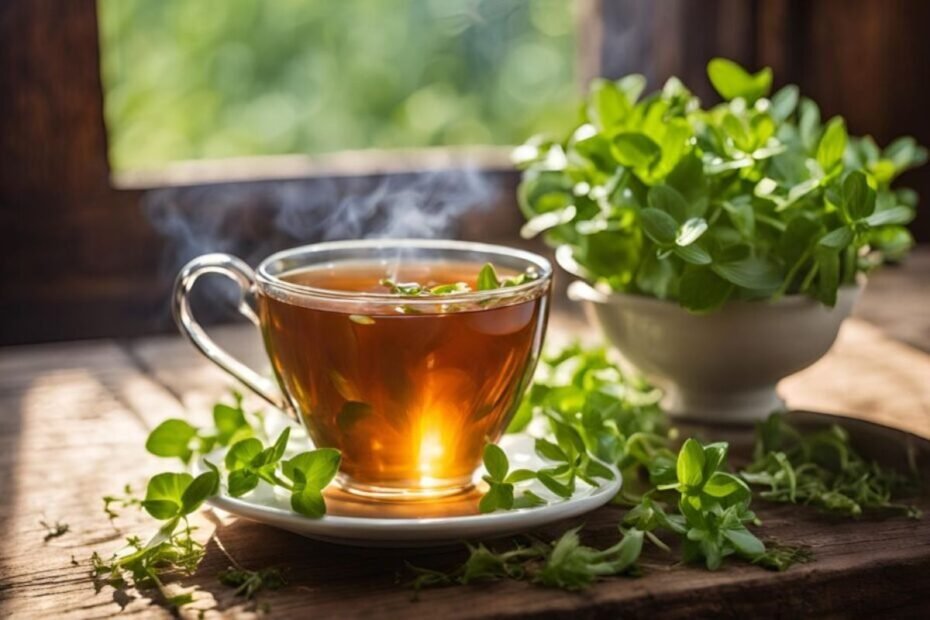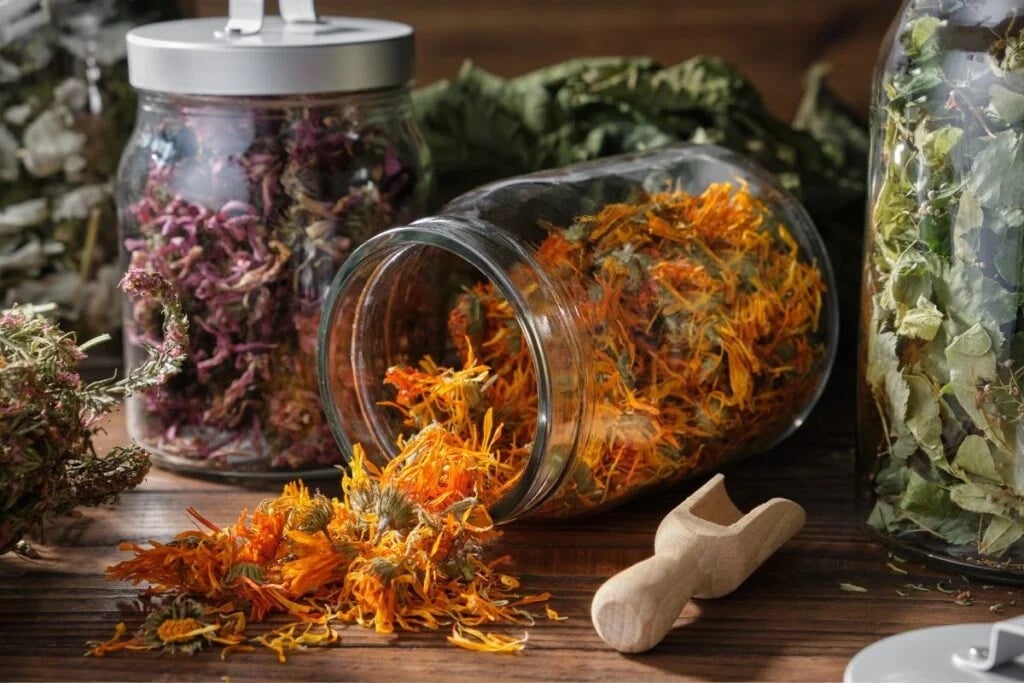Chickweed is a small yet extraordinarily beneficial plant, known by many names: starwort, satin flower, starweed, and others. Although commonly regarded as a weed, chickweed is a valuable source of health-promoting substances, which are highly esteemed in traditional medicine. Chickweed tea benefits include being a natural remedy for improving health and enhancing beauty. In this article, we will explore what makes chickweed tea unique, as well as how to prepare and use it.
Chickweed: A Natural Marvel
Chickweed (Stellaria) is a herbaceous plant belonging to the Caryophyllaceae family. It often grows in meadows, forests, gardens, and vegetable beds. This small, delicate plant has tiny green leaves and blooms with small, star-shaped white flowers, which inspired its Latin name Stellaria, meaning “star.”
Chickweed blooms from spring to late autumn. It is native to Europe but also widely distributed throughout the world. From this moment, you won’t dismiss chickweed as a weed and uproot it without a second thought. This plant is a highly valuable source for cooking and medicine.
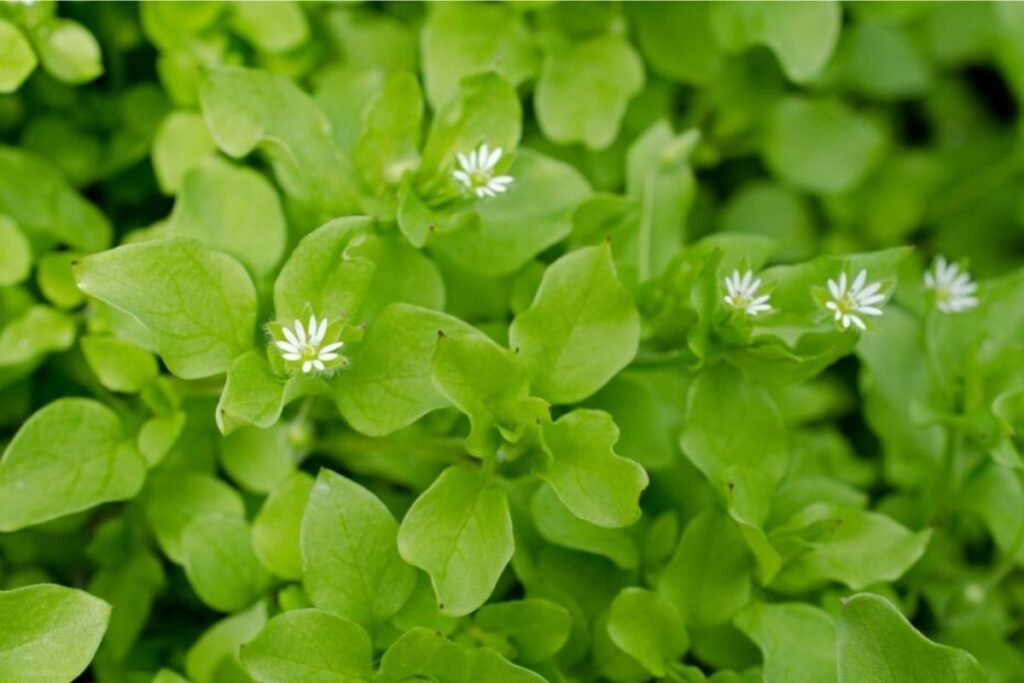
Nutritional Properties of Chickweed
Chickweed is not only a medicinal plant but also a nutritious one. Its stems and leaves are packed with an abundance of minerals and vitamins:
- Vitamin C strengthens the immune system and reduces inflammation.
- Iron aids in blood production and energy maintenance.
- Vitamin A supports vision and skin health.
- Calcium and magnesium are essential for bone health and proper nervous system function.
- Vitamin E improves skin and nervous system health and promotes overall rejuvenation.
- Vitamin K is an energy source for all body cells and helps strengthen capillary walls.
Additionally, chickweed contains antioxidants that help neutralize free radicals in the body, protecting cells from damage. These nutritional properties make the plant valuable, if fresh or dried. Chickweed tea offers a simple and effective way to obtain these beneficial nutrients.
Chickweed Tea Benefits
If we fully understood how beneficial chickweed tea is for our health, we might never consider discarding it. Chickweed is a medicinal plant, no less valuable than chamomile or thyme. This tea has essential vitamins, minerals, and bioactive compounds that support physical and emotional well-being. What health benefits does this tea offer?
- Anti-inflammatory Effects. Chickweed tea possesses anti-inflammatory properties that help alleviate inflammation in the body. Consuming tea regularly may reduce respiratory illnesses, joint pain, and gastrointestinal inflammation symptoms. This is particularly beneficial for individuals suffering from arthritis, gastritis, or chronic respiratory conditions.
- Digestive System Support. Starwort tea acts as a natural digestive enzyme. It aids digestion, reduces bloating, and helps prevent constipation. Additionally, it promotes the elimination of toxins from the body, making it a popular choice in detox programs.
- Immune System Boost. The vitamin C content in chickweed helps strengthen the body’s defense mechanisms. This tea can protect against colds, viral infections, and other seasonal ailments. Moreover, the vitamin A in chickweed acts as an immune stimulant, actively protecting mucous membranes from infections.
- Calming Effects. Chickweed tea has a gentle calming effect, making it useful for people experiencing stress, insomnia, or persistent anxiety. When consumed in the evening, it promotes relaxation and improves sleep quality.
- Improved Skin Health. Thanks to its blood-cleansing properties, chickweed tea benefits to heal skin issues such as acne, eczema, or allergic reactions. When applied externally, it also promotes the healing of wounds, bedsores, and cuts.
- Blood Purification. Traditional medicine uses chickweed tea to purify blood and eliminate toxins in traditional medicine. It also effectively treats urinary tract infections, cystitis, and kidney stones.
- Hormonal System Regulation. Experts recommend chickweed tea for individuals with hypothyroidism or hyperthyroidism, as well as those with adrenal or ovarian dysfunction.

Chickweed Tea for External Use
In addition to its effectiveness in treating various ailments internally, chickweed tea can also be used externally as compresses to relieve pain, inflammation, or non-healing wounds:
- Wound Healing: Thanks to its antibacterial and anti-inflammatory properties, chickweed accelerates the healing of minor wounds, scratches, or insect bites. It treats chronic wounds and bedsores.
- Eczema and Dermatitis: Chickweed decoction can reduce itching and inflammation associated with skin conditions. Compresses made from chickweed tea treat areas affected by psoriasis.
- Eye Compresses: Warm chickweed decoction soothes tired or irritated eyes.
- Pain Relief: Starwort tea compresses help alleviate pain caused by joint diseases. It also reduces pain from sciatica, rheumatism, arthritis, and sprains.
How to Prepare Chickweed Tea
Preparing chickweed tea is straightforward, but following a few guidelines ensures preserving its beneficial properties.
Choosing the Raw Material:
Fresh: Harvest chickweed from ecologically clean areas, away from roads or polluted sites.
Dried: ensure the plant retains its color and aroma during drying. Store dried chickweed in airtight containers in a dry, cool place.
Tea Preparation: For one cup of tea, use 1–2 teaspoons of dried chickweed or a handful of fresh chickweed. Pour 200 ml of boiling water over the chickweed. Cover and let it steep for 10–15 minutes. Strain the tea and, if desired, enhance the flavor with honey, lemon, or mint leaves.
Consumption: Drink the tea warm, 2–3 times daily, depending on the desired effect.
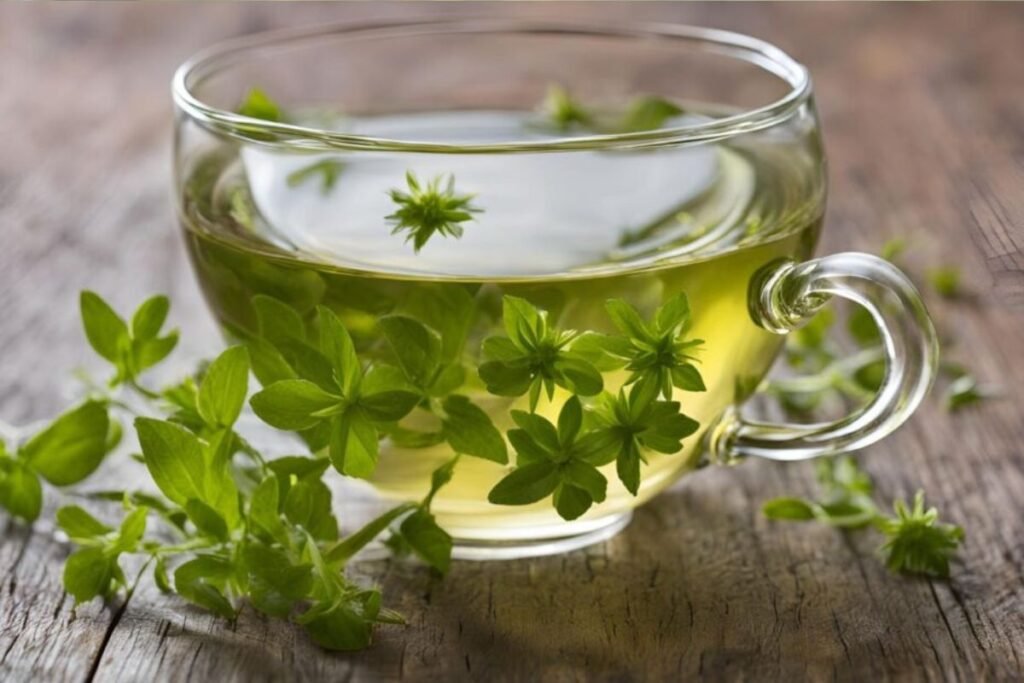
Chickweed Tea for Thyroid Conditions
People know chickweed tea benefits as a hormone-balancing agent, making its tea suitable for regulating overactive and underactive thyroid function.
Ingredients:
- A handful of fresh chickweed (or 1 tablespoon of dried chickweed)
- 500 ml water
Preparation: Pour boiling water over the chickweed and simmer for 5–10 minutes. Strain.
Consumption: Drink the entire prepared amount throughout the day.
Chickweed Tea for Immune Support
Rich in vitamin C and carotene, chickweed tea benefits strengthening the immune system. It stimulates proper immune function and protects mucous membranes from infections and other damage.
Ingredients:
- 2 teaspoons of dried chickweed
- 1 cup of water
Preparation: Steep the chickweed in boiling water for 5–10 minutes. Strain.
Consumption: Drink warm, optionally sweetened with honey or flavored with lemon. It is recommended to consume 2 cups of chickweed tea per day.
Possible Side Effects and Precautions
Although chickweed tea is considered a gentle remedy, moderation is key, and it is essential to be aware of potential side effects:
- Allergic Reactions: Some individuals may be sensitive to chickweed. Discontinue use immediately if you experience itching, skin redness, or other allergy symptoms.
- Interaction with Medications: Chickweed may influence blood pressure and clotting. Those taking blood pressure medications or anticoagulants should consult their doctor before consuming chickweed tea.
- Risk of Overconsumption: Excessive consumption of chickweed tea can lead to stomach irritation or diarrhea. To avoid overconsumption, limit intake to 2–3 cups per day.
- Pregnancy and Breastfeeding: Pregnant and breastfeeding women should use chickweed tea cautiously. Although there is limited scientific evidence of adverse effects, it is advisable to consult a doctor before using any medicinal herbs.
- Effects of Long-term Use: Although chickweed tea can be used as a seasonal remedy, prolonged, continuous use may lead to tolerance or reduced effectiveness. Experts recommend taking breaks and combining chickweed tea with other herbal preparations.
When considering self-treatment with medicinal herbs, always consult your healthcare provider, who can provide guidance based on your specific health condition.
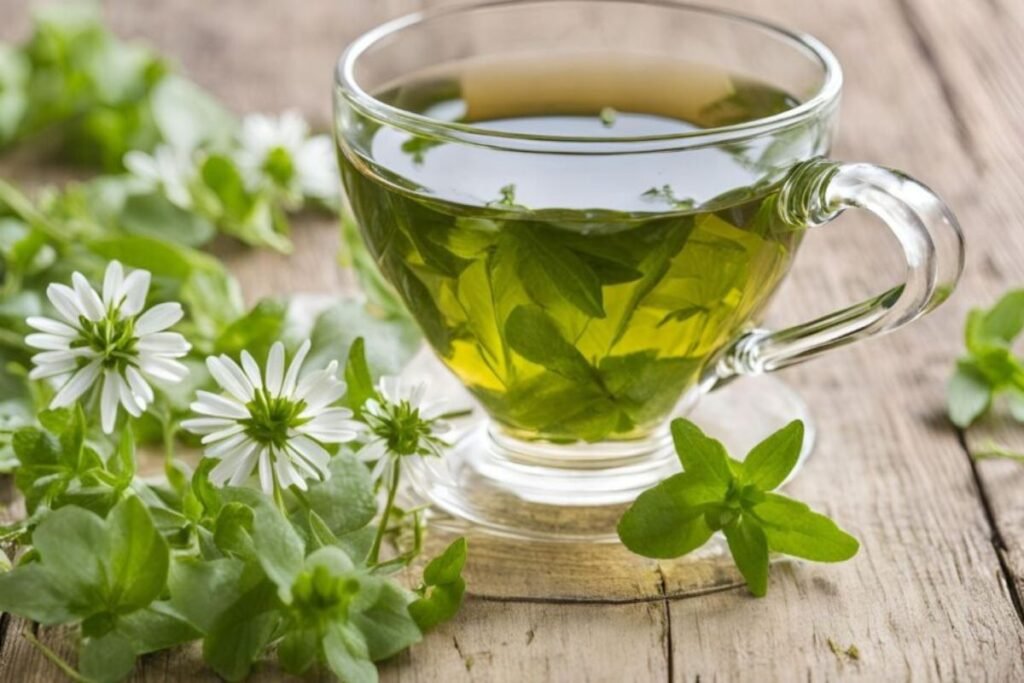
Yet Unrated Chickweed Tea Benefits
Chickweed tea is a statement about how nature supports our health. Its gentle yet effective properties can improve physical and emotional well-being. With its versatility as both an internal booster and an external remedy, chickweed is a simple, affordable, and widely accessible herb that can become a valuable addition to daily health routines. Let’s try more chickweed tea benefits.
It is essential to practice moderation, source chickweed responsibly, and consult health professionals before incorporating chickweed tea into your regimen. You can fully enjoy its benefits as a delicious and health-promoting beverage.
Sources:
- https://www.healthline.com/nutrition/chickweed-benefits
- https://www.verywellhealth.com/chickweed-what-should-i-know-about-it-89437
- https://www.webmd.com/vitamins/ai/ingredientmono-622/chickweed
- https://www.almanac.com/chickweed-benefits-edible-spring-weed-many-uses
- https://www.rhs.org.uk/plants/119111/stellaria-media/details
- https://www.indigo-herbs.co.uk/natural-health-guide/benefits/chickweed
Associative photos © Canva.
